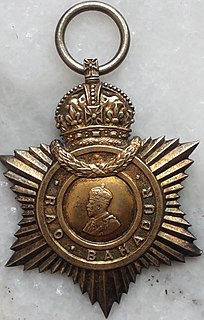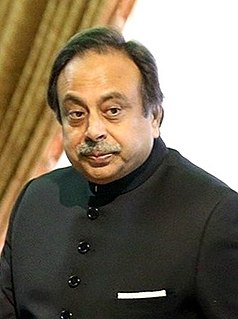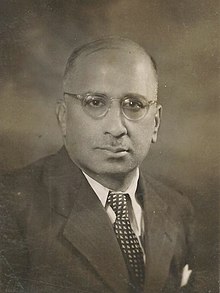
Patiala is a city in southeastern Punjab, northwestern India. It is the fourth largest city in the state and is the administrative capital of Patiala district. Patiala is located around the Qila Mubarak constructed by the Sidhu Jat chieftain Ala Singh, who founded the royal dynasty of Patiala State in 1763, and after whom the city is named.

Guru Har Krishan was the eighth of the ten Sikh Gurus. At the age of 5, he became the youngest Guru in Sikhism on 7 October 1661, succeeding his father, Guru Har Rai. He contracted smallpox in 1664 and died before reaching his eighth birthday. It is said that he died because he contracted smallpox while successfully curing his followers.

The following outline is provides an overview of Sikhism, or Sikhi.
Jainism (/ˈdʒeɪnɪzəm/), traditionally known as Jain Dharma, is an ancient Indian religion. Jain dharma traces its spiritual ideas and history through a succession of twenty-four leaders or tirthankaras, with the first in current time cycle being Lord Rishabhanatha, whom the Jain tradition holds to have lived millions of years ago, the twenty-third tirthankara Parshvanatha whom historians date to 8th or 7th century BCE, and the 24th tirthankara, Mahāvīra around 500 BCE. Jains believe that Jainism is an eternal dharma with the tirthankaras guiding every cycle of the Jain cosmology.

Safdarabad, is a city in Sheikhupura District in the Punjab province of Pakistan. The city of Safdar Abad is the capital of Safdarabad Tehsil. Its Postal code or ZIP code is 39540. Its urban area is approximately 600 acres. Until 2005 it was a tehsil of Sheikhupura District, but in that year Sheikhpura was bifurcated and the district of Nankana Sahib was created. - with Safdarabad as one of its tehsils. Now at present, once again Safdarabad has been rejoined with Sheikhupura as a Tehsil. The city of Safdarabad lies 95 km from Lahore the provincial capital of Punjab. The area has a population of more than 40,000 the majority of whom are Muslims. There are many Engineering & Medical in students from Safdarabad admit in different Universities including UET, Lahore.

Bhai Mani Singh was an 18th-century Sikh scholar and martyr. He was a childhood companion of Guru Gobind Singh and took the vows of Sikhism when the Guru inaugurated the Khalsa in March 1699. Soon after that, the Guru sent him to Amritsar to take charge of Harmandir Sahib, which had been without a custodian since 1696. He took control and steered the course of Sikh destiny at a critical stage in Sikh history.
Sikhism was coined by Guru Gobind Singh Ji. He was the tenth Guru of the 17 century in the Punjab region in the northern part of the Indian subcontinent. The Faith practices were formalised by Guru Gobind Singh Ji on 13 April 1699. The latter baptised five Sikh people from different parts of India and had different social backgrounds to form Khalsa (ਖ਼ਾਲਸਾ). The first five, Pure Ones, then baptised Gobind Singh ji into the Khalsa fold. This gives the order of Khalsa, a history of around 300 years.

Rai Bahadur, abbreviated R.B., was a title of honour bestowed during British rule in India to individuals for faithful service or acts of public welfare to the Empire. From 1911, the title was accompanied by a medal called a Title Badge. Translated, Rao means "prince", and Bahadur means "brave" or "most honourable". Bestowed mainly on Hindus, the equivalent title for Muslim and Parsi subjects was Khan Bahadur. For Sikhs it was Sardar Bahadur.

Ashtar Ausaf Ali is a Pakistani lawyer who served as the 32nd Attorney-General for Pakistan from 2016 to 2018. As AG, he co-drafted the Twenty-Fifth Amendment to the Constitution of Pakistan, which merged the Federally Administered Tribal Areas with Khyber Pakhtunkhwa.

Kiratpur also known as Kiratpur Sahib is a town in Rupnagar district, Punjab, India. The town is the location of the Gurdwara Patal Puri where Sikhs take ashes of their deceased.
Rai Bahadur Chaudhary Dewan Chand Saini, MBE (1887-unknown) of Gurdaspur was a well-known criminal lawyer and politician of British Punjab.
Khan Bahadur Bakshi Ghulam Haider Khan was Faujdar of a unit at the time of Battle of Assaye, which was a major battle of the Second Anglo-Maratha War under the command of Major General Arthur Wellesley. Latterly, he became the royal chief head of the military services hence called the Mir Bakshi. He was in charge of intelligence gathering, and also made recommendations to the royal court for military appointments and promotions.

Tafazzul Hussain Khan was a key army personnel during the 1857 revolt. He was Risaldar of a mounted troop (Risala) during 1857 Indian revolt and was entitled, 'Captain' and 'Sardar Bahadur' by British India.
Talib Chakwali (1900-1988) was an Urdu ghazal and nazm writer.

Banda Singh Bahadur, was a Sikh warrior and a commander of Khalsa army. At age 15 he left home to become a Hindu ascetic, and was given the name ‘'Madho Das'’. He established a monastery at Nānded, on the bank of the river Godāvarī, where in September 1708 he was visited by, and became a disciple of, Guru Gobind Singh, who came to Nanded to collect forces and live last years of his life, he gave Lachman Das the new name of Banda Singh Bahadur, after the Baptism Ceremony. He was given five arrows by the Guru as a blessing for the battles ahead. He came to Khanda in Sonipat and assembled a fighting force and led the struggle against the Mughal Empire. His first major action was the sacking of the Mughal provincial capital, Samana, in November 1709. After establishing his authority and Khalsa rule in Punjab, Banda Singh Bahadur abolished the zamindari system, and granted property rights to the tillers of the land. Banda Singh was captured by the Mughals and tortured to death in 1715–1716.
The New Year Honours 1909 were appointments by King Edward VII to various orders and honours to reward and highlight good works by members of the British Empire. They were announced on 5 January 1909.
Rai Sahib Nagendra Kumar Bhattacharyya was an eminent Indian criminal lawyer practising in the High Court of Calcutta and a Member of the West Bengal Legislative Council.
The Mughal-Sikh Wars were a series of campaigns between Mughal and Sikh armies, taking place in present-day Pakistan and the India between the 16th and 18th centuries. Punjabi Muslims of Punjab like the Muslim Jatts, Muslim Rajputs etc were once who accepted Sikhi or any other way stood with Sikh Gurus.
The 1911 Delhi Durbar was held in December 1911 following the coronation in London in June of that year of King George V and Queen Mary. The King and Queen travelled to Delhi for the Durbar. For the occasion, the statutory limits of the membership of the Order of the Star of India and the Order of the Indian Empire were increased and many appointments were made to these and other orders. These honours were published in a supplement to the London Gazette dated 8 December 1911.

Karamchand Bachhawat (1542-1607) (विभूति) was the Dewan, Prime Minister of Bikaner State in the former Rajputana from 1571 to 1591. Karamchand, a descendant of Bachhraj, was a valiant warrior, a good administrator and a strategist in Bikaner and had a good relationship with Akbar. In 1591, fearing for his life, he resigned. At Akbar's invitation, Karamchand later joined the emperor as an adviser to the Lahore court. If you look at history, it has always celebrated the lives of the kings or emperors of an era but carries very little information about the those supportive of them, who stood serving a purpose. Behind every king are unsung nobles, who acted as pillars of support. Karamchand Bachhawat is one such person.












